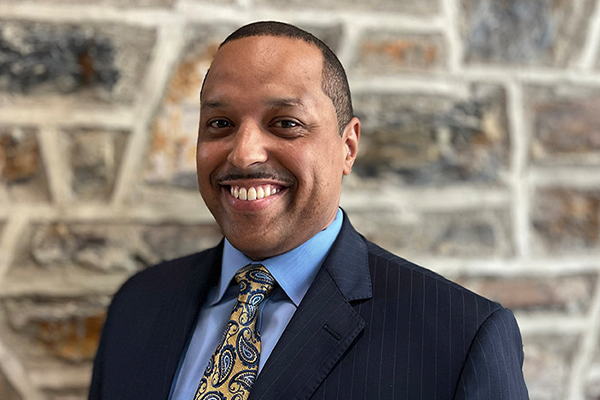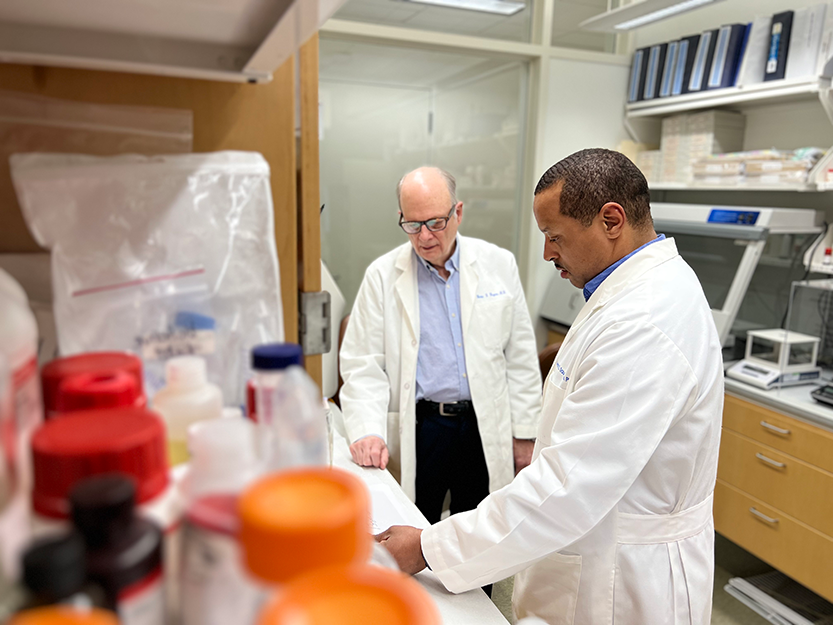
During a whirlwind year of achievements, Kevin Saunders, PhD, earned a multi-million-dollar contract from the National Institutes of Health to study a universal coronavirus vaccine, received the 2023 Emerging Leader Award from the Duke Medical Alumni Association, and was named associate director of the Duke Human Vaccine Institute.
The director of DHVI, Barton Haynes, MD, chose him for the newly created position to help steer the institute as it works to prevent a range of diseases from HIV to seasonal flu.
Saunders, a professor of surgery, microbiology, and immunology at Duke University School of Medicine, has been an integral part of DHVI since 2014. His focus sharpened during the tumultuous years of the COVID-19 pandemic, pondering whether a single vaccine could provide protection from the undulating waves of viral variants.
“As a scientist, one of the things that you’re always doing is just trying to answer a question, right?” said Saunders. “You’re just trying to get to that next discovery that gives us the next piece of knowledge.”
His research is paving the way for a pan-coronavirus vaccine that could head off any coronavirus and even viruses that cause the common cold.
In 2021, during a period of accelerated scientific discovery across the globe, his paper in Nature was picked as the Paper of the Year by the International Society of Vaccines.
When he got the email about the selection, “I had to read it twice. So, it was an amazing, amazing accomplishment,” he said.
SEE ALSO: Developing a Pan-Coronavirus Vaccine
But Saunders' journey toward leadership began long before the past year’s accolades. He skipped kindergarten to enroll in first grade, entered high school at age 13, and enrolled in 10th grade classes while technically a 9th student.
Now 40, it seems he has been one step ahead of his peers for most of his life.

The beginning of Saunders' scientific passion began in high school when he learned biology was something he was good at.
Teacher Ed McMichael, one of a string of mentors, offered his greenhouse for science fair projects. McMichael’s influence propelled Saunders to a city-wide science fair in the 11th grade where he tested antibacterial resistance using household cleaners.
It was an early effort at team science: his mother, a registered nurse, helped him find journal articles about antibacterial resistance while Saunders conducted experiments with agar plates.
“I knew I wanted to work toward a career in research and not so much medicine,” Saunders recalls. “I enjoy focusing on a problem and seeing how well I can figure it out.”
In his journey from Davidson College to Duke School of Medicine where he earned a PhD in molecular genetics and microbiology in 2010, Saunders was influenced by genetics teacher Karen G. Hales, PhD, professor of biology at Davidson College, and immunologist Georgia Tomaras, PhD, director of the Duke Center for AIDS Research.
Under the mentorship of Tomaras and Haynes at DHVI, he found his calling – unraveling the mysteries of how the immune system combats HIV infection.
“(At Duke) we have the resources and infrastructure to be able to do large projects and to go after the really difficult questions."
Kevin Saunders, PhD
With Haynes, Saunders is sharpening his leadership skills for an academic setting, benefiting from Haynes' 44 years of leadership at Duke.
During his tenure at the NIH from 2010 to 2014, Saunders explored the use of antibodies as defenders from infections. It was at the NIH that the seed of translational science was planted.
“That is where we started to talk about how to translate science over to something that can help people,” he said.
Choosing Duke as his next scientific home was a deliberate move, hoping to replicate the expansive portfolio of the NIH. “I wanted to be in a place that would be like the NIH because there, if you can think it, you can do it.
“(At Duke) we have the resources and infrastructure to be able to do large projects and to go after the really difficult questions,” he said.
His lab at DHVI is a key part of the team working to create an antibody-based vaccine against HIV. One challenge the Saunders lab is tackling is that the sugar molecules on the HIV-1 envelope, known as Env glycans, don’t kickstart a robust immune response on their own. The laboratory aims to target these molecules and prompt the immune system to produce antibodies that can effectively neutralize the HIV virus.
The Saunders lab is also at the forefront of DHVI’s role in developing a coronavirus vaccine that’s protective against a broad range of coronaviruses which new research shows is an achievable goal.
Saunders’ impact extends beyond the research. He is forging alliances with other academic institutions to fortify science education and stimulate interest in vaccine research.
In January, Saunders was the plenary speaker at the annual Martin Luther King Jr Banquet for the Duke chapter of the Student National Medical Association. It’s a moment he cherishes as one of his proudest achievements.
“That was one of the biggest achievements I think I had of the past year of being able to go there and talk about some of the inclusion work that we do here in DHVI,” said Saunders.
Pursuing solutions that could lead to a healthier and more resilient world requires a balancing act between work and home life.
On weekdays he wakes at 4 a.m. to squeeze in work before the rest of the household rises: wife Jessica and their 10-year-old daughter and 6-year-old son. Once everyone is up, there’s the morning routine of breakfast and getting out the door to work and school.
Most every night after he returns home, and after spending time with his family, he does scientific reading and writing and reviews experimental results.
One way he gets time for himself is running. He says he started running during the pandemic and averages 10 miles a week. “It’s very calming for me. I push everything aside.”
As Saunders navigates scientific research and champions inclusive excellence at Duke, he’s committed to pioneering new discoveries.
“I like the idea of being able to work on things that are new. We’re doing really important research here.”